Artificial Intelligence and Unilever: Operations and Processes Report
VerifiedAdded on 2021/09/16
|15
|3568
|136
Report
AI Summary
This report provides an executive summary of how megatrends, specifically digitalization and artificial intelligence (AI), affect the operations of Unilever, a global consumer goods company. It explores Unilever's implementation of AI in its recruitment process, marketing strategies, and its ability to predict customer behavior. The report highlights the advantages of AI, such as improved efficiency and data-driven decision-making, while also acknowledging its limitations, including the lack of a one-size-fits-all solution, high costs, and the need for human oversight. Furthermore, the report offers recommendations for Unilever to optimize its use of AI, including aligning AI with automation processes, collecting customer data to inform international strategies, and addressing the limitations of the technology to achieve greater success in the consumer goods industry. The report concludes by emphasizing the need for continuous monitoring and adaptation to megatrends to maintain profitability and competitiveness.
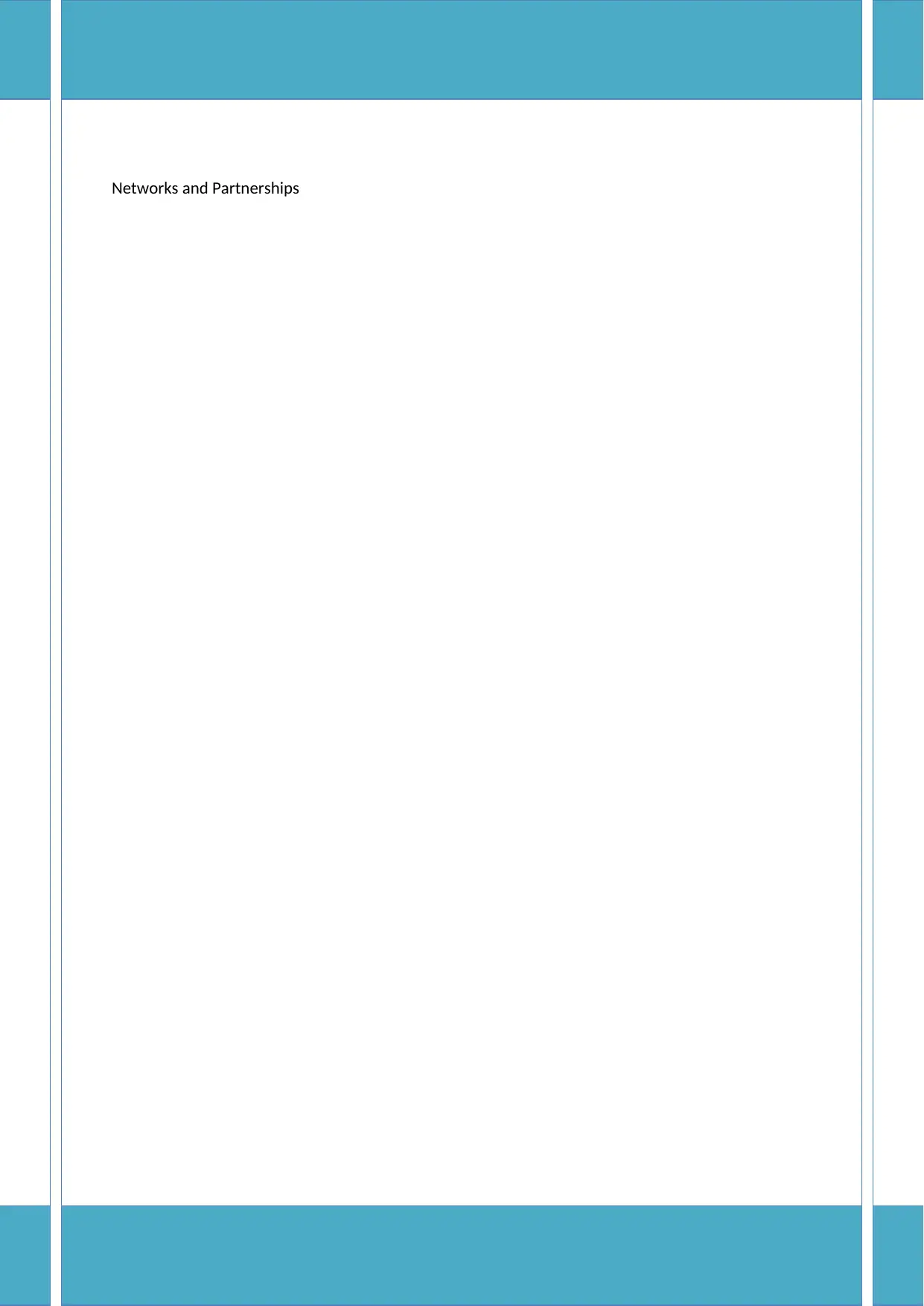
Networks and Partnerships
Paraphrase This Document
Need a fresh take? Get an instant paraphrase of this document with our AI Paraphraser
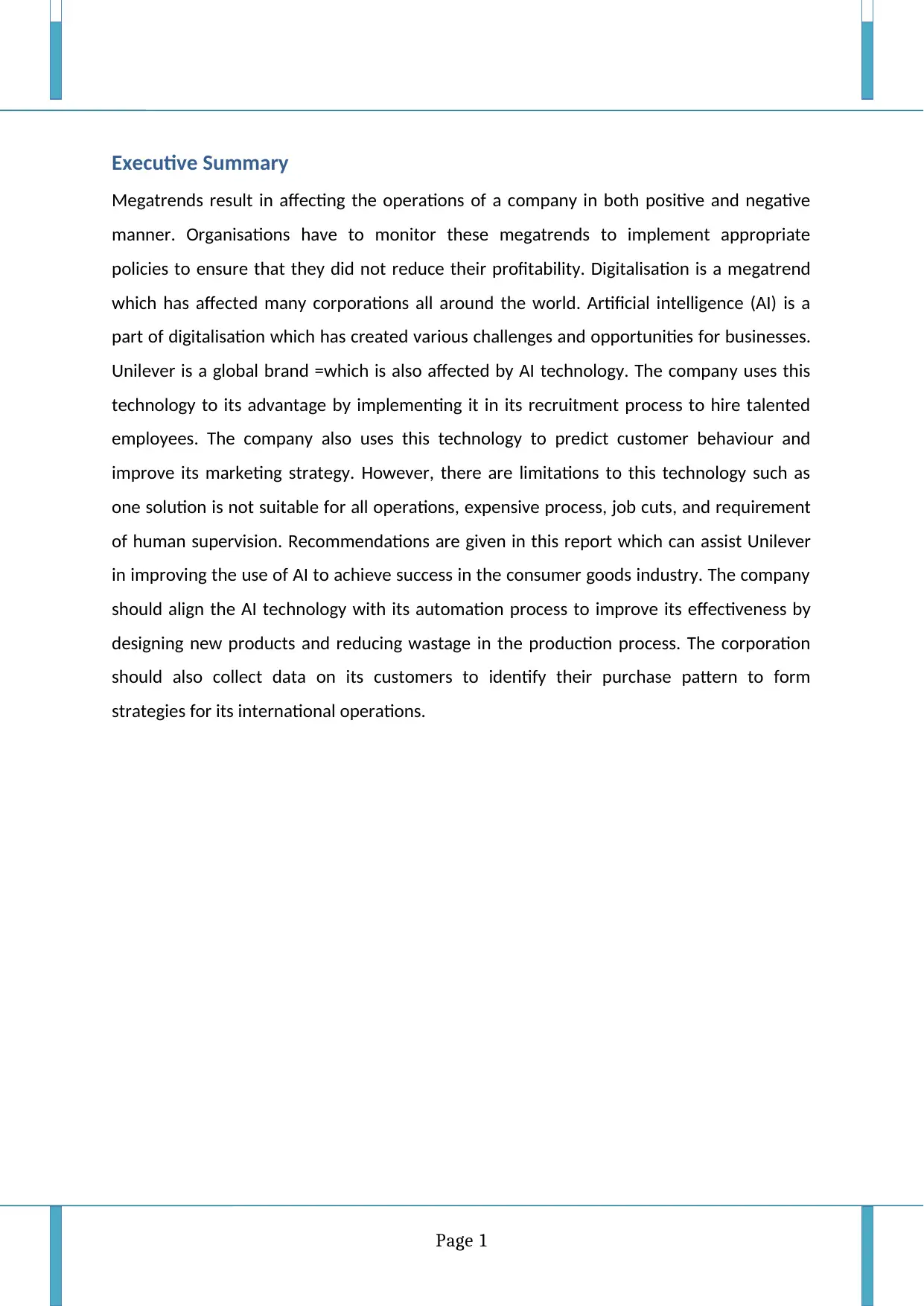
Executive Summary
Megatrends result in affecting the operations of a company in both positive and negative
manner. Organisations have to monitor these megatrends to implement appropriate
policies to ensure that they did not reduce their profitability. Digitalisation is a megatrend
which has affected many corporations all around the world. Artificial intelligence (AI) is a
part of digitalisation which has created various challenges and opportunities for businesses.
Unilever is a global brand =which is also affected by AI technology. The company uses this
technology to its advantage by implementing it in its recruitment process to hire talented
employees. The company also uses this technology to predict customer behaviour and
improve its marketing strategy. However, there are limitations to this technology such as
one solution is not suitable for all operations, expensive process, job cuts, and requirement
of human supervision. Recommendations are given in this report which can assist Unilever
in improving the use of AI to achieve success in the consumer goods industry. The company
should align the AI technology with its automation process to improve its effectiveness by
designing new products and reducing wastage in the production process. The corporation
should also collect data on its customers to identify their purchase pattern to form
strategies for its international operations.
Page 1
Megatrends result in affecting the operations of a company in both positive and negative
manner. Organisations have to monitor these megatrends to implement appropriate
policies to ensure that they did not reduce their profitability. Digitalisation is a megatrend
which has affected many corporations all around the world. Artificial intelligence (AI) is a
part of digitalisation which has created various challenges and opportunities for businesses.
Unilever is a global brand =which is also affected by AI technology. The company uses this
technology to its advantage by implementing it in its recruitment process to hire talented
employees. The company also uses this technology to predict customer behaviour and
improve its marketing strategy. However, there are limitations to this technology such as
one solution is not suitable for all operations, expensive process, job cuts, and requirement
of human supervision. Recommendations are given in this report which can assist Unilever
in improving the use of AI to achieve success in the consumer goods industry. The company
should align the AI technology with its automation process to improve its effectiveness by
designing new products and reducing wastage in the production process. The corporation
should also collect data on its customers to identify their purchase pattern to form
strategies for its international operations.
Page 1
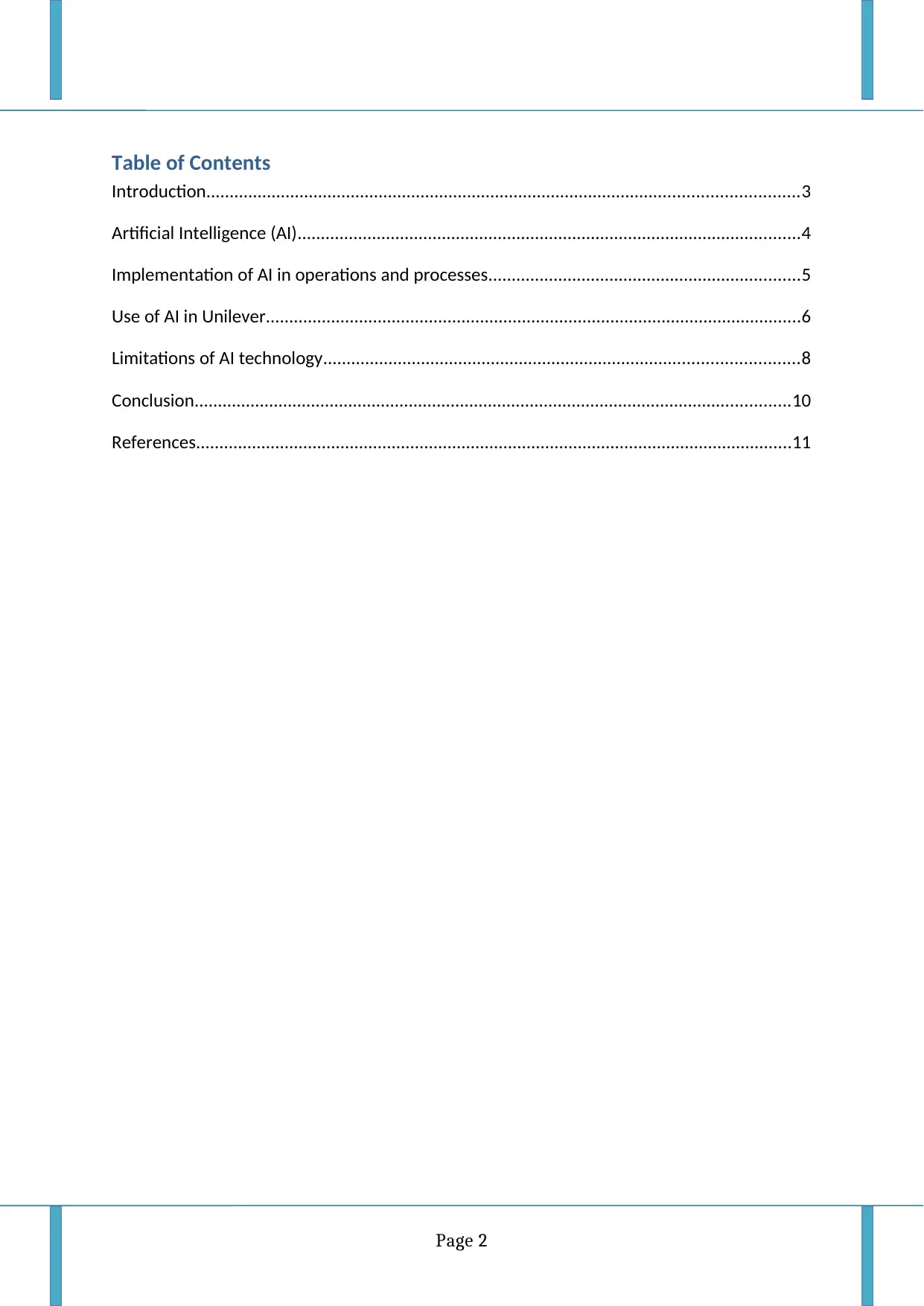
Table of Contents
Introduction...............................................................................................................................3
Artificial Intelligence (AI)............................................................................................................4
Implementation of AI in operations and processes...................................................................5
Use of AI in Unilever...................................................................................................................6
Limitations of AI technology......................................................................................................8
Conclusion................................................................................................................................10
References................................................................................................................................11
Page 2
Introduction...............................................................................................................................3
Artificial Intelligence (AI)............................................................................................................4
Implementation of AI in operations and processes...................................................................5
Use of AI in Unilever...................................................................................................................6
Limitations of AI technology......................................................................................................8
Conclusion................................................................................................................................10
References................................................................................................................................11
Page 2
⊘ This is a preview!⊘
Do you want full access?
Subscribe today to unlock all pages.

Trusted by 1+ million students worldwide
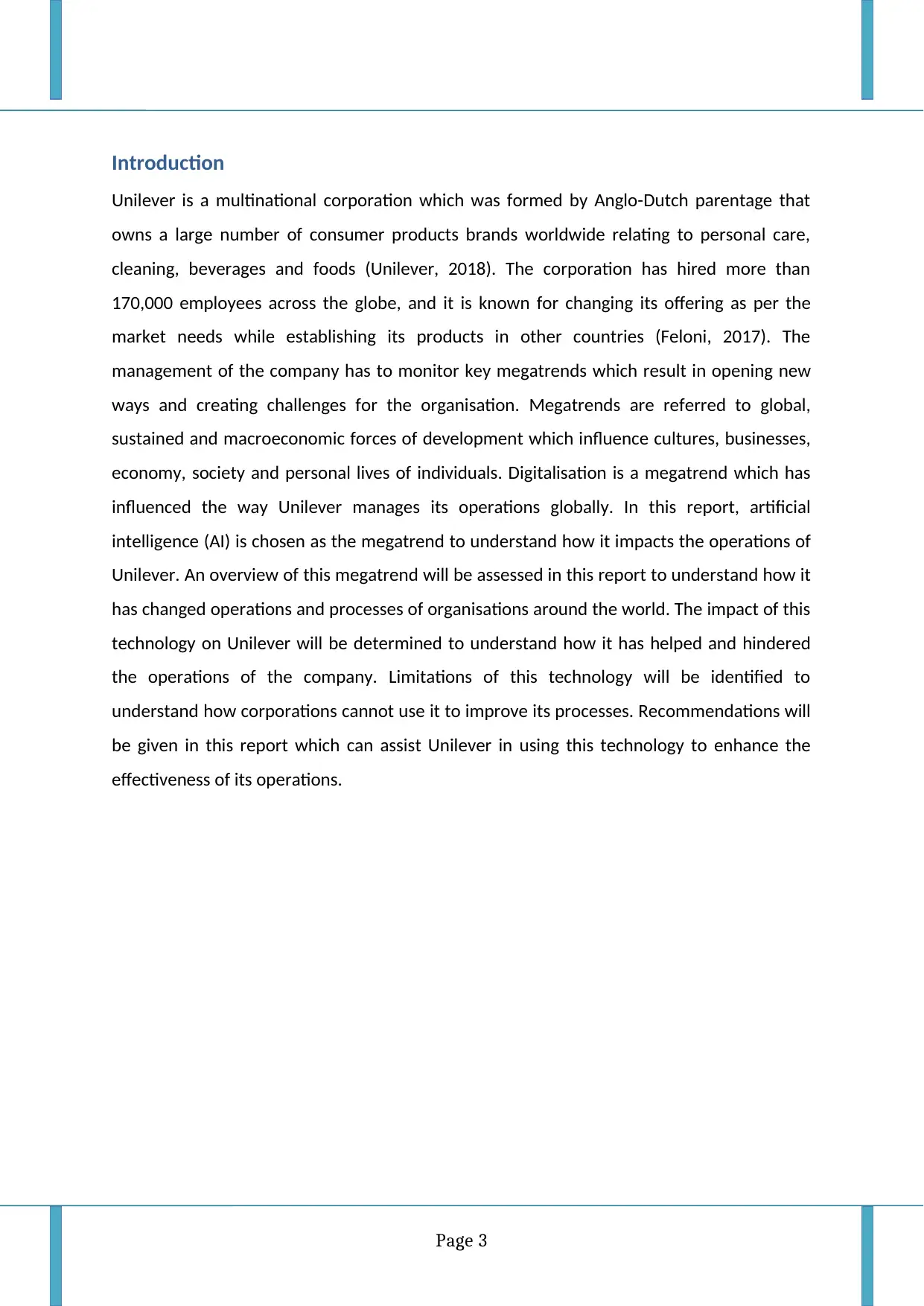
Introduction
Unilever is a multinational corporation which was formed by Anglo-Dutch parentage that
owns a large number of consumer products brands worldwide relating to personal care,
cleaning, beverages and foods (Unilever, 2018). The corporation has hired more than
170,000 employees across the globe, and it is known for changing its offering as per the
market needs while establishing its products in other countries (Feloni, 2017). The
management of the company has to monitor key megatrends which result in opening new
ways and creating challenges for the organisation. Megatrends are referred to global,
sustained and macroeconomic forces of development which influence cultures, businesses,
economy, society and personal lives of individuals. Digitalisation is a megatrend which has
influenced the way Unilever manages its operations globally. In this report, artificial
intelligence (AI) is chosen as the megatrend to understand how it impacts the operations of
Unilever. An overview of this megatrend will be assessed in this report to understand how it
has changed operations and processes of organisations around the world. The impact of this
technology on Unilever will be determined to understand how it has helped and hindered
the operations of the company. Limitations of this technology will be identified to
understand how corporations cannot use it to improve its processes. Recommendations will
be given in this report which can assist Unilever in using this technology to enhance the
effectiveness of its operations.
Page 3
Unilever is a multinational corporation which was formed by Anglo-Dutch parentage that
owns a large number of consumer products brands worldwide relating to personal care,
cleaning, beverages and foods (Unilever, 2018). The corporation has hired more than
170,000 employees across the globe, and it is known for changing its offering as per the
market needs while establishing its products in other countries (Feloni, 2017). The
management of the company has to monitor key megatrends which result in opening new
ways and creating challenges for the organisation. Megatrends are referred to global,
sustained and macroeconomic forces of development which influence cultures, businesses,
economy, society and personal lives of individuals. Digitalisation is a megatrend which has
influenced the way Unilever manages its operations globally. In this report, artificial
intelligence (AI) is chosen as the megatrend to understand how it impacts the operations of
Unilever. An overview of this megatrend will be assessed in this report to understand how it
has changed operations and processes of organisations around the world. The impact of this
technology on Unilever will be determined to understand how it has helped and hindered
the operations of the company. Limitations of this technology will be identified to
understand how corporations cannot use it to improve its processes. Recommendations will
be given in this report which can assist Unilever in using this technology to enhance the
effectiveness of its operations.
Page 3
Paraphrase This Document
Need a fresh take? Get an instant paraphrase of this document with our AI Paraphraser
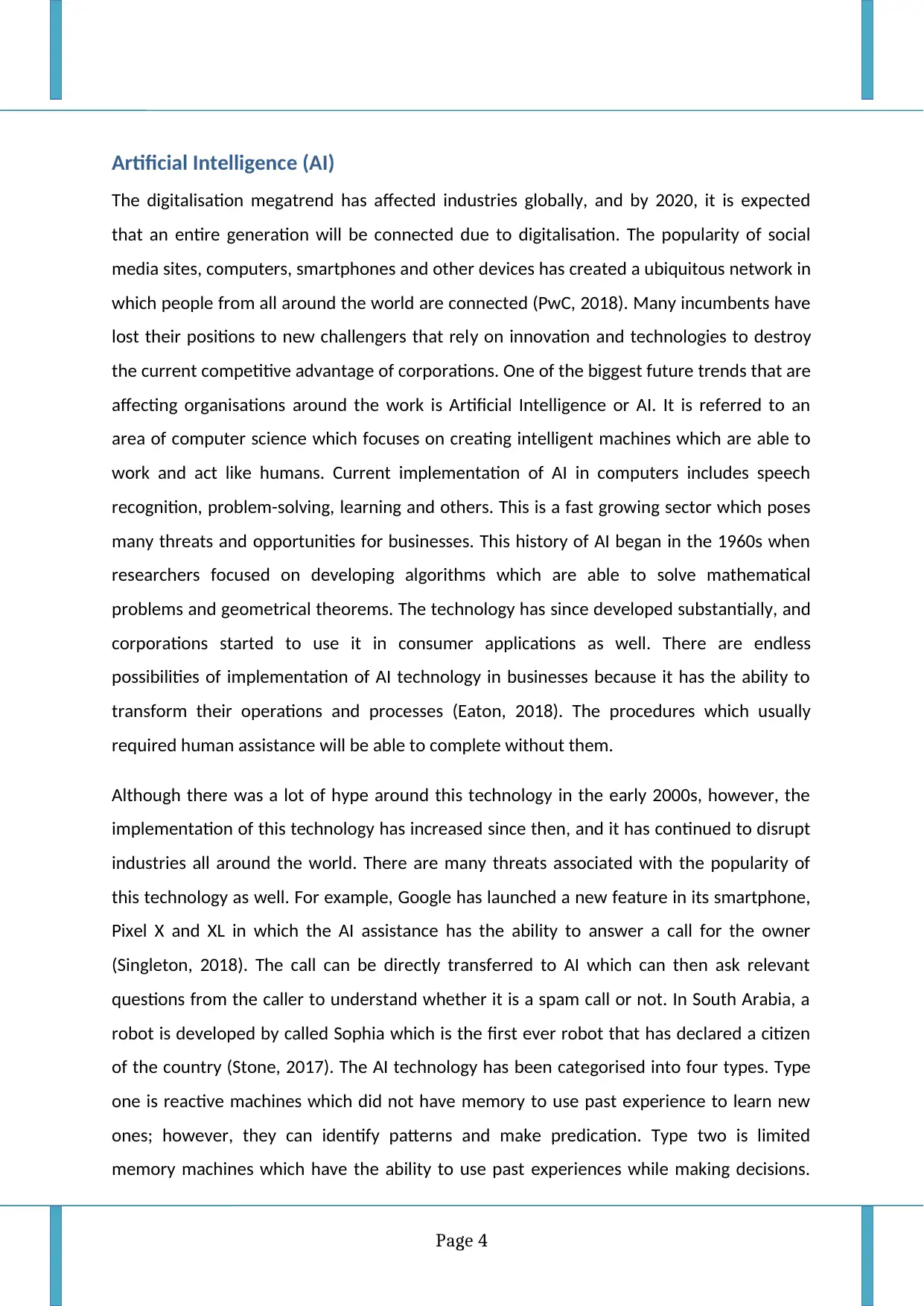
Artificial Intelligence (AI)
The digitalisation megatrend has affected industries globally, and by 2020, it is expected
that an entire generation will be connected due to digitalisation. The popularity of social
media sites, computers, smartphones and other devices has created a ubiquitous network in
which people from all around the world are connected (PwC, 2018). Many incumbents have
lost their positions to new challengers that rely on innovation and technologies to destroy
the current competitive advantage of corporations. One of the biggest future trends that are
affecting organisations around the work is Artificial Intelligence or AI. It is referred to an
area of computer science which focuses on creating intelligent machines which are able to
work and act like humans. Current implementation of AI in computers includes speech
recognition, problem-solving, learning and others. This is a fast growing sector which poses
many threats and opportunities for businesses. This history of AI began in the 1960s when
researchers focused on developing algorithms which are able to solve mathematical
problems and geometrical theorems. The technology has since developed substantially, and
corporations started to use it in consumer applications as well. There are endless
possibilities of implementation of AI technology in businesses because it has the ability to
transform their operations and processes (Eaton, 2018). The procedures which usually
required human assistance will be able to complete without them.
Although there was a lot of hype around this technology in the early 2000s, however, the
implementation of this technology has increased since then, and it has continued to disrupt
industries all around the world. There are many threats associated with the popularity of
this technology as well. For example, Google has launched a new feature in its smartphone,
Pixel X and XL in which the AI assistance has the ability to answer a call for the owner
(Singleton, 2018). The call can be directly transferred to AI which can then ask relevant
questions from the caller to understand whether it is a spam call or not. In South Arabia, a
robot is developed by called Sophia which is the first ever robot that has declared a citizen
of the country (Stone, 2017). The AI technology has been categorised into four types. Type
one is reactive machines which did not have memory to use past experience to learn new
ones; however, they can identify patterns and make predication. Type two is limited
memory machines which have the ability to use past experiences while making decisions.
Page 4
The digitalisation megatrend has affected industries globally, and by 2020, it is expected
that an entire generation will be connected due to digitalisation. The popularity of social
media sites, computers, smartphones and other devices has created a ubiquitous network in
which people from all around the world are connected (PwC, 2018). Many incumbents have
lost their positions to new challengers that rely on innovation and technologies to destroy
the current competitive advantage of corporations. One of the biggest future trends that are
affecting organisations around the work is Artificial Intelligence or AI. It is referred to an
area of computer science which focuses on creating intelligent machines which are able to
work and act like humans. Current implementation of AI in computers includes speech
recognition, problem-solving, learning and others. This is a fast growing sector which poses
many threats and opportunities for businesses. This history of AI began in the 1960s when
researchers focused on developing algorithms which are able to solve mathematical
problems and geometrical theorems. The technology has since developed substantially, and
corporations started to use it in consumer applications as well. There are endless
possibilities of implementation of AI technology in businesses because it has the ability to
transform their operations and processes (Eaton, 2018). The procedures which usually
required human assistance will be able to complete without them.
Although there was a lot of hype around this technology in the early 2000s, however, the
implementation of this technology has increased since then, and it has continued to disrupt
industries all around the world. There are many threats associated with the popularity of
this technology as well. For example, Google has launched a new feature in its smartphone,
Pixel X and XL in which the AI assistance has the ability to answer a call for the owner
(Singleton, 2018). The call can be directly transferred to AI which can then ask relevant
questions from the caller to understand whether it is a spam call or not. In South Arabia, a
robot is developed by called Sophia which is the first ever robot that has declared a citizen
of the country (Stone, 2017). The AI technology has been categorised into four types. Type
one is reactive machines which did not have memory to use past experience to learn new
ones; however, they can identify patterns and make predication. Type two is limited
memory machines which have the ability to use past experiences while making decisions.
Page 4
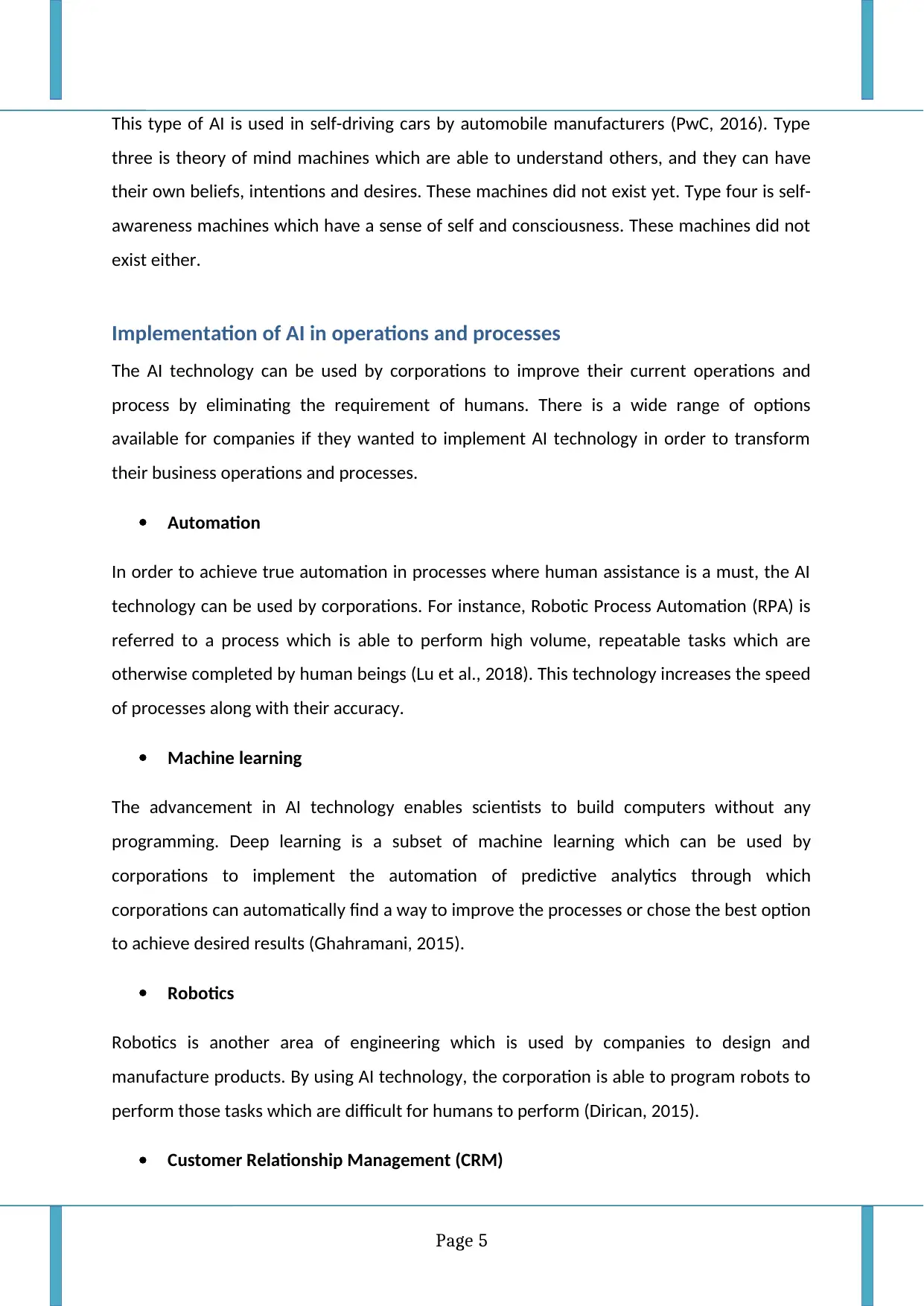
This type of AI is used in self-driving cars by automobile manufacturers (PwC, 2016). Type
three is theory of mind machines which are able to understand others, and they can have
their own beliefs, intentions and desires. These machines did not exist yet. Type four is self-
awareness machines which have a sense of self and consciousness. These machines did not
exist either.
Implementation of AI in operations and processes
The AI technology can be used by corporations to improve their current operations and
process by eliminating the requirement of humans. There is a wide range of options
available for companies if they wanted to implement AI technology in order to transform
their business operations and processes.
Automation
In order to achieve true automation in processes where human assistance is a must, the AI
technology can be used by corporations. For instance, Robotic Process Automation (RPA) is
referred to a process which is able to perform high volume, repeatable tasks which are
otherwise completed by human beings (Lu et al., 2018). This technology increases the speed
of processes along with their accuracy.
Machine learning
The advancement in AI technology enables scientists to build computers without any
programming. Deep learning is a subset of machine learning which can be used by
corporations to implement the automation of predictive analytics through which
corporations can automatically find a way to improve the processes or chose the best option
to achieve desired results (Ghahramani, 2015).
Robotics
Robotics is another area of engineering which is used by companies to design and
manufacture products. By using AI technology, the corporation is able to program robots to
perform those tasks which are difficult for humans to perform (Dirican, 2015).
Customer Relationship Management (CRM)
Page 5
three is theory of mind machines which are able to understand others, and they can have
their own beliefs, intentions and desires. These machines did not exist yet. Type four is self-
awareness machines which have a sense of self and consciousness. These machines did not
exist either.
Implementation of AI in operations and processes
The AI technology can be used by corporations to improve their current operations and
process by eliminating the requirement of humans. There is a wide range of options
available for companies if they wanted to implement AI technology in order to transform
their business operations and processes.
Automation
In order to achieve true automation in processes where human assistance is a must, the AI
technology can be used by corporations. For instance, Robotic Process Automation (RPA) is
referred to a process which is able to perform high volume, repeatable tasks which are
otherwise completed by human beings (Lu et al., 2018). This technology increases the speed
of processes along with their accuracy.
Machine learning
The advancement in AI technology enables scientists to build computers without any
programming. Deep learning is a subset of machine learning which can be used by
corporations to implement the automation of predictive analytics through which
corporations can automatically find a way to improve the processes or chose the best option
to achieve desired results (Ghahramani, 2015).
Robotics
Robotics is another area of engineering which is used by companies to design and
manufacture products. By using AI technology, the corporation is able to program robots to
perform those tasks which are difficult for humans to perform (Dirican, 2015).
Customer Relationship Management (CRM)
Page 5
⊘ This is a preview!⊘
Do you want full access?
Subscribe today to unlock all pages.

Trusted by 1+ million students worldwide
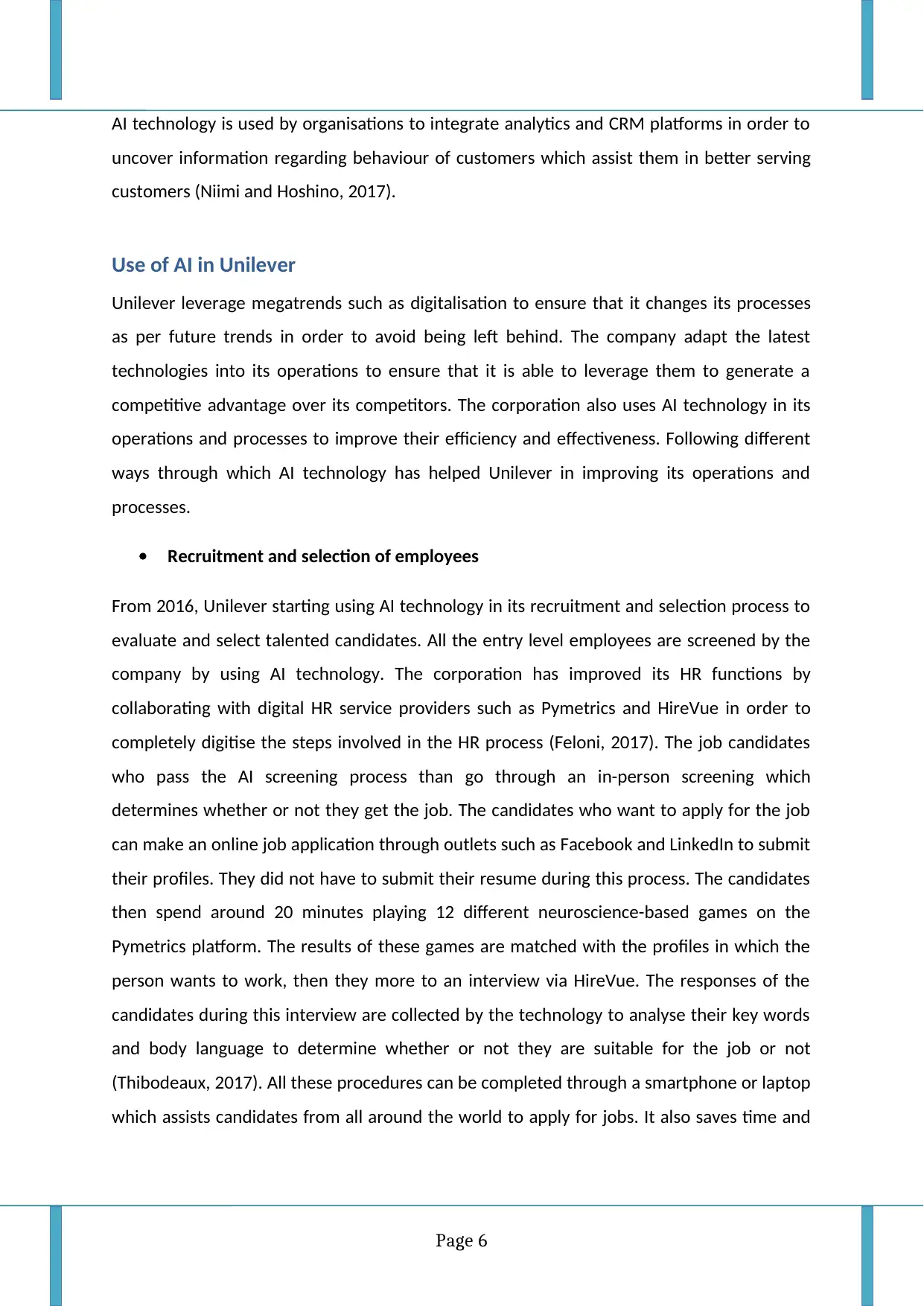
AI technology is used by organisations to integrate analytics and CRM platforms in order to
uncover information regarding behaviour of customers which assist them in better serving
customers (Niimi and Hoshino, 2017).
Use of AI in Unilever
Unilever leverage megatrends such as digitalisation to ensure that it changes its processes
as per future trends in order to avoid being left behind. The company adapt the latest
technologies into its operations to ensure that it is able to leverage them to generate a
competitive advantage over its competitors. The corporation also uses AI technology in its
operations and processes to improve their efficiency and effectiveness. Following different
ways through which AI technology has helped Unilever in improving its operations and
processes.
Recruitment and selection of employees
From 2016, Unilever starting using AI technology in its recruitment and selection process to
evaluate and select talented candidates. All the entry level employees are screened by the
company by using AI technology. The corporation has improved its HR functions by
collaborating with digital HR service providers such as Pymetrics and HireVue in order to
completely digitise the steps involved in the HR process (Feloni, 2017). The job candidates
who pass the AI screening process than go through an in-person screening which
determines whether or not they get the job. The candidates who want to apply for the job
can make an online job application through outlets such as Facebook and LinkedIn to submit
their profiles. They did not have to submit their resume during this process. The candidates
then spend around 20 minutes playing 12 different neuroscience-based games on the
Pymetrics platform. The results of these games are matched with the profiles in which the
person wants to work, then they more to an interview via HireVue. The responses of the
candidates during this interview are collected by the technology to analyse their key words
and body language to determine whether or not they are suitable for the job or not
(Thibodeaux, 2017). All these procedures can be completed through a smartphone or laptop
which assists candidates from all around the world to apply for jobs. It also saves time and
Page 6
uncover information regarding behaviour of customers which assist them in better serving
customers (Niimi and Hoshino, 2017).
Use of AI in Unilever
Unilever leverage megatrends such as digitalisation to ensure that it changes its processes
as per future trends in order to avoid being left behind. The company adapt the latest
technologies into its operations to ensure that it is able to leverage them to generate a
competitive advantage over its competitors. The corporation also uses AI technology in its
operations and processes to improve their efficiency and effectiveness. Following different
ways through which AI technology has helped Unilever in improving its operations and
processes.
Recruitment and selection of employees
From 2016, Unilever starting using AI technology in its recruitment and selection process to
evaluate and select talented candidates. All the entry level employees are screened by the
company by using AI technology. The corporation has improved its HR functions by
collaborating with digital HR service providers such as Pymetrics and HireVue in order to
completely digitise the steps involved in the HR process (Feloni, 2017). The job candidates
who pass the AI screening process than go through an in-person screening which
determines whether or not they get the job. The candidates who want to apply for the job
can make an online job application through outlets such as Facebook and LinkedIn to submit
their profiles. They did not have to submit their resume during this process. The candidates
then spend around 20 minutes playing 12 different neuroscience-based games on the
Pymetrics platform. The results of these games are matched with the profiles in which the
person wants to work, then they more to an interview via HireVue. The responses of the
candidates during this interview are collected by the technology to analyse their key words
and body language to determine whether or not they are suitable for the job or not
(Thibodeaux, 2017). All these procedures can be completed through a smartphone or laptop
which assists candidates from all around the world to apply for jobs. It also saves time and
Page 6
Paraphrase This Document
Need a fresh take? Get an instant paraphrase of this document with our AI Paraphraser
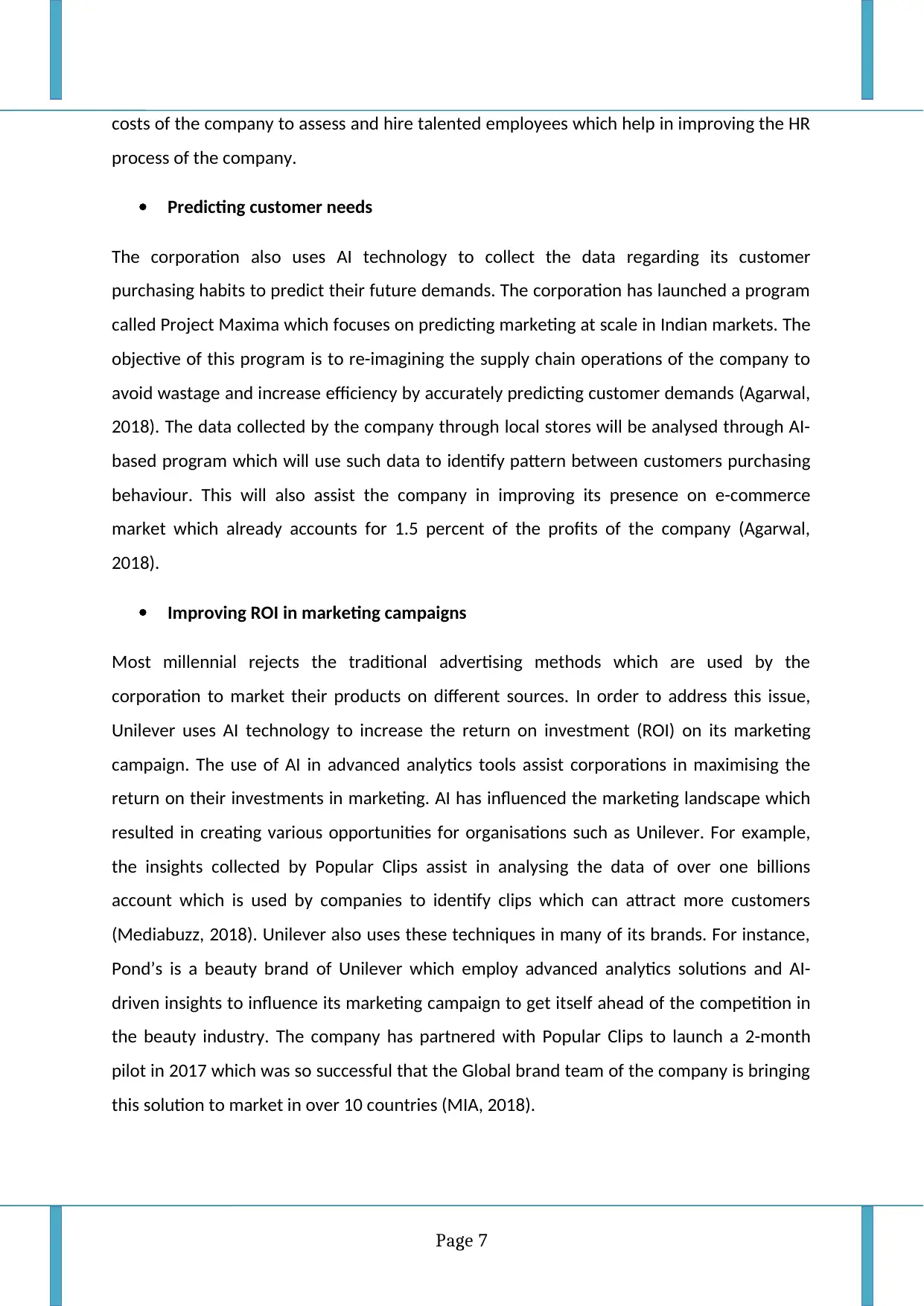
costs of the company to assess and hire talented employees which help in improving the HR
process of the company.
Predicting customer needs
The corporation also uses AI technology to collect the data regarding its customer
purchasing habits to predict their future demands. The corporation has launched a program
called Project Maxima which focuses on predicting marketing at scale in Indian markets. The
objective of this program is to re-imagining the supply chain operations of the company to
avoid wastage and increase efficiency by accurately predicting customer demands (Agarwal,
2018). The data collected by the company through local stores will be analysed through AI-
based program which will use such data to identify pattern between customers purchasing
behaviour. This will also assist the company in improving its presence on e-commerce
market which already accounts for 1.5 percent of the profits of the company (Agarwal,
2018).
Improving ROI in marketing campaigns
Most millennial rejects the traditional advertising methods which are used by the
corporation to market their products on different sources. In order to address this issue,
Unilever uses AI technology to increase the return on investment (ROI) on its marketing
campaign. The use of AI in advanced analytics tools assist corporations in maximising the
return on their investments in marketing. AI has influenced the marketing landscape which
resulted in creating various opportunities for organisations such as Unilever. For example,
the insights collected by Popular Clips assist in analysing the data of over one billions
account which is used by companies to identify clips which can attract more customers
(Mediabuzz, 2018). Unilever also uses these techniques in many of its brands. For instance,
Pond’s is a beauty brand of Unilever which employ advanced analytics solutions and AI-
driven insights to influence its marketing campaign to get itself ahead of the competition in
the beauty industry. The company has partnered with Popular Clips to launch a 2-month
pilot in 2017 which was so successful that the Global brand team of the company is bringing
this solution to market in over 10 countries (MIA, 2018).
Page 7
process of the company.
Predicting customer needs
The corporation also uses AI technology to collect the data regarding its customer
purchasing habits to predict their future demands. The corporation has launched a program
called Project Maxima which focuses on predicting marketing at scale in Indian markets. The
objective of this program is to re-imagining the supply chain operations of the company to
avoid wastage and increase efficiency by accurately predicting customer demands (Agarwal,
2018). The data collected by the company through local stores will be analysed through AI-
based program which will use such data to identify pattern between customers purchasing
behaviour. This will also assist the company in improving its presence on e-commerce
market which already accounts for 1.5 percent of the profits of the company (Agarwal,
2018).
Improving ROI in marketing campaigns
Most millennial rejects the traditional advertising methods which are used by the
corporation to market their products on different sources. In order to address this issue,
Unilever uses AI technology to increase the return on investment (ROI) on its marketing
campaign. The use of AI in advanced analytics tools assist corporations in maximising the
return on their investments in marketing. AI has influenced the marketing landscape which
resulted in creating various opportunities for organisations such as Unilever. For example,
the insights collected by Popular Clips assist in analysing the data of over one billions
account which is used by companies to identify clips which can attract more customers
(Mediabuzz, 2018). Unilever also uses these techniques in many of its brands. For instance,
Pond’s is a beauty brand of Unilever which employ advanced analytics solutions and AI-
driven insights to influence its marketing campaign to get itself ahead of the competition in
the beauty industry. The company has partnered with Popular Clips to launch a 2-month
pilot in 2017 which was so successful that the Global brand team of the company is bringing
this solution to market in over 10 countries (MIA, 2018).
Page 7
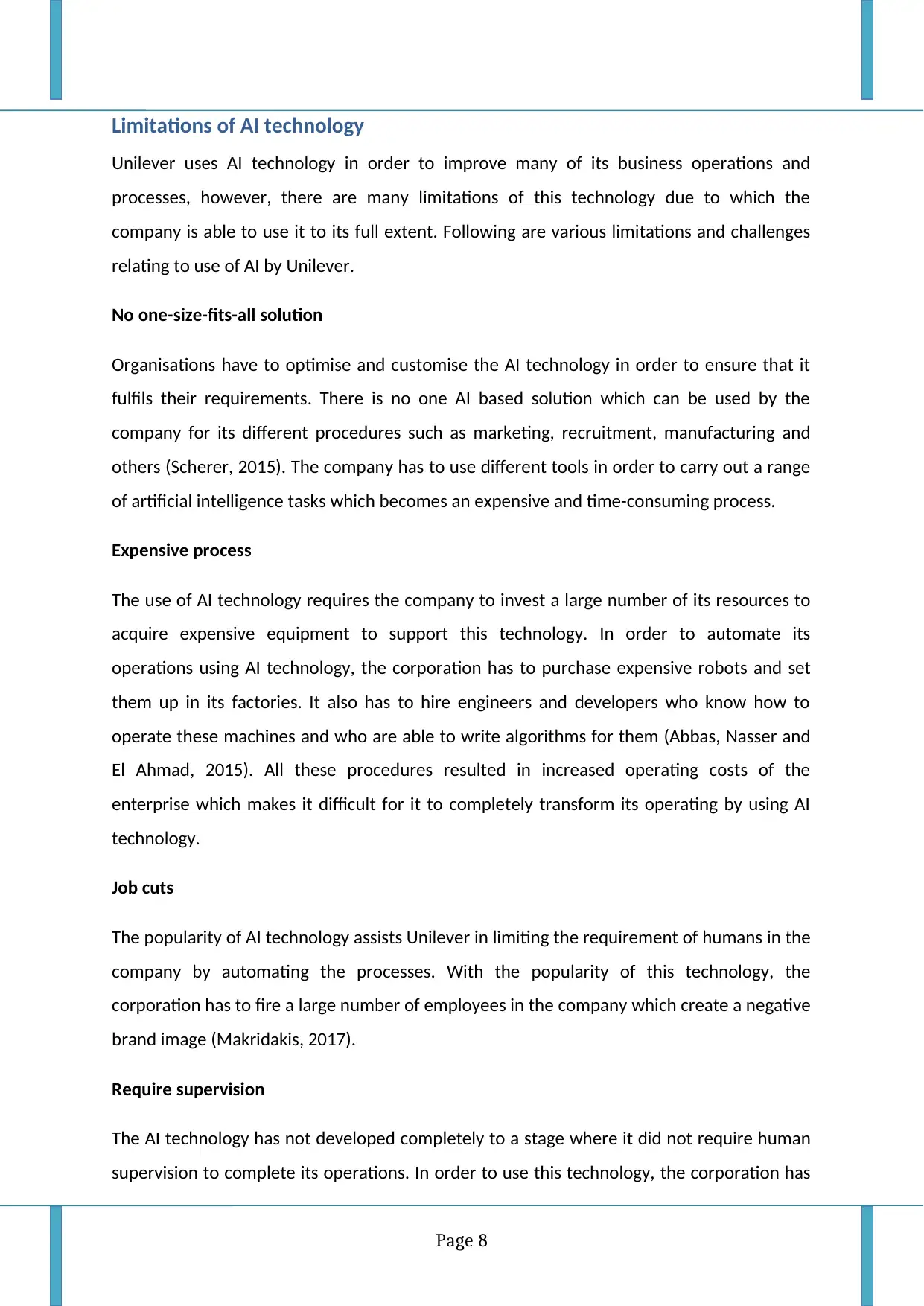
Limitations of AI technology
Unilever uses AI technology in order to improve many of its business operations and
processes, however, there are many limitations of this technology due to which the
company is able to use it to its full extent. Following are various limitations and challenges
relating to use of AI by Unilever.
No one-size-fits-all solution
Organisations have to optimise and customise the AI technology in order to ensure that it
fulfils their requirements. There is no one AI based solution which can be used by the
company for its different procedures such as marketing, recruitment, manufacturing and
others (Scherer, 2015). The company has to use different tools in order to carry out a range
of artificial intelligence tasks which becomes an expensive and time-consuming process.
Expensive process
The use of AI technology requires the company to invest a large number of its resources to
acquire expensive equipment to support this technology. In order to automate its
operations using AI technology, the corporation has to purchase expensive robots and set
them up in its factories. It also has to hire engineers and developers who know how to
operate these machines and who are able to write algorithms for them (Abbas, Nasser and
El Ahmad, 2015). All these procedures resulted in increased operating costs of the
enterprise which makes it difficult for it to completely transform its operating by using AI
technology.
Job cuts
The popularity of AI technology assists Unilever in limiting the requirement of humans in the
company by automating the processes. With the popularity of this technology, the
corporation has to fire a large number of employees in the company which create a negative
brand image (Makridakis, 2017).
Require supervision
The AI technology has not developed completely to a stage where it did not require human
supervision to complete its operations. In order to use this technology, the corporation has
Page 8
Unilever uses AI technology in order to improve many of its business operations and
processes, however, there are many limitations of this technology due to which the
company is able to use it to its full extent. Following are various limitations and challenges
relating to use of AI by Unilever.
No one-size-fits-all solution
Organisations have to optimise and customise the AI technology in order to ensure that it
fulfils their requirements. There is no one AI based solution which can be used by the
company for its different procedures such as marketing, recruitment, manufacturing and
others (Scherer, 2015). The company has to use different tools in order to carry out a range
of artificial intelligence tasks which becomes an expensive and time-consuming process.
Expensive process
The use of AI technology requires the company to invest a large number of its resources to
acquire expensive equipment to support this technology. In order to automate its
operations using AI technology, the corporation has to purchase expensive robots and set
them up in its factories. It also has to hire engineers and developers who know how to
operate these machines and who are able to write algorithms for them (Abbas, Nasser and
El Ahmad, 2015). All these procedures resulted in increased operating costs of the
enterprise which makes it difficult for it to completely transform its operating by using AI
technology.
Job cuts
The popularity of AI technology assists Unilever in limiting the requirement of humans in the
company by automating the processes. With the popularity of this technology, the
corporation has to fire a large number of employees in the company which create a negative
brand image (Makridakis, 2017).
Require supervision
The AI technology has not developed completely to a stage where it did not require human
supervision to complete its operations. In order to use this technology, the corporation has
Page 8
⊘ This is a preview!⊘
Do you want full access?
Subscribe today to unlock all pages.

Trusted by 1+ million students worldwide
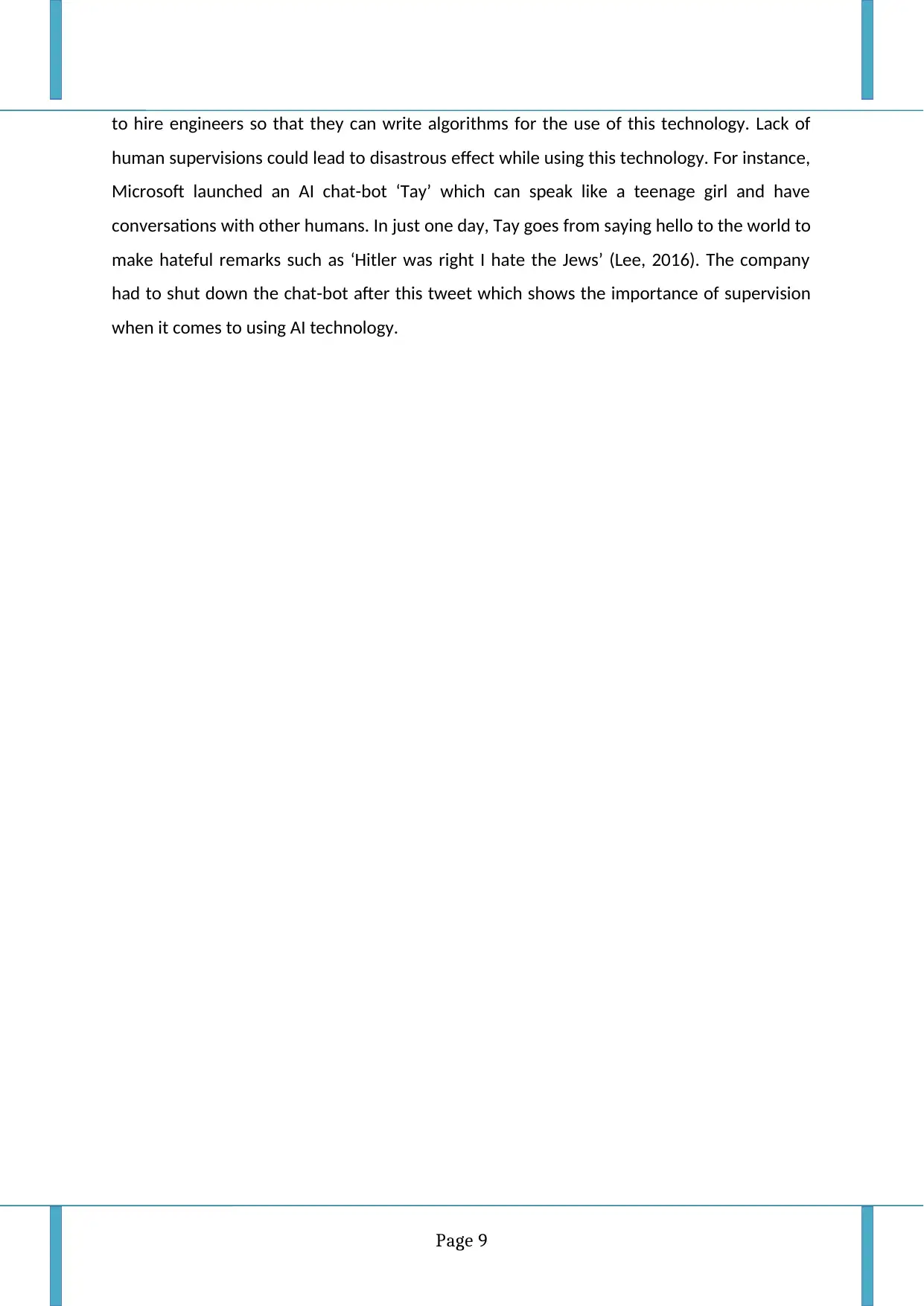
to hire engineers so that they can write algorithms for the use of this technology. Lack of
human supervisions could lead to disastrous effect while using this technology. For instance,
Microsoft launched an AI chat-bot ‘Tay’ which can speak like a teenage girl and have
conversations with other humans. In just one day, Tay goes from saying hello to the world to
make hateful remarks such as ‘Hitler was right I hate the Jews’ (Lee, 2016). The company
had to shut down the chat-bot after this tweet which shows the importance of supervision
when it comes to using AI technology.
Page 9
human supervisions could lead to disastrous effect while using this technology. For instance,
Microsoft launched an AI chat-bot ‘Tay’ which can speak like a teenage girl and have
conversations with other humans. In just one day, Tay goes from saying hello to the world to
make hateful remarks such as ‘Hitler was right I hate the Jews’ (Lee, 2016). The company
had to shut down the chat-bot after this tweet which shows the importance of supervision
when it comes to using AI technology.
Page 9
Paraphrase This Document
Need a fresh take? Get an instant paraphrase of this document with our AI Paraphraser
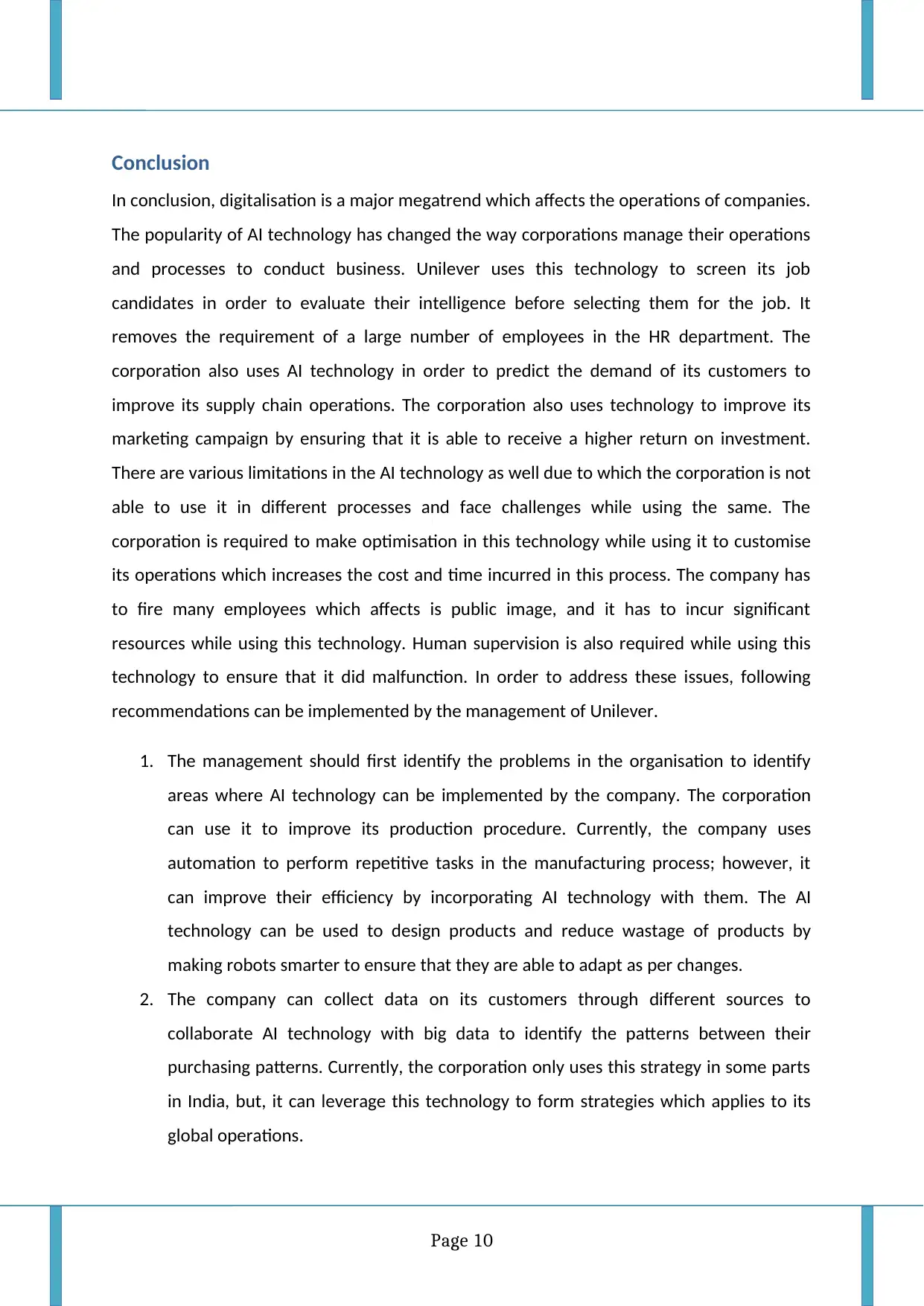
Conclusion
In conclusion, digitalisation is a major megatrend which affects the operations of companies.
The popularity of AI technology has changed the way corporations manage their operations
and processes to conduct business. Unilever uses this technology to screen its job
candidates in order to evaluate their intelligence before selecting them for the job. It
removes the requirement of a large number of employees in the HR department. The
corporation also uses AI technology in order to predict the demand of its customers to
improve its supply chain operations. The corporation also uses technology to improve its
marketing campaign by ensuring that it is able to receive a higher return on investment.
There are various limitations in the AI technology as well due to which the corporation is not
able to use it in different processes and face challenges while using the same. The
corporation is required to make optimisation in this technology while using it to customise
its operations which increases the cost and time incurred in this process. The company has
to fire many employees which affects is public image, and it has to incur significant
resources while using this technology. Human supervision is also required while using this
technology to ensure that it did malfunction. In order to address these issues, following
recommendations can be implemented by the management of Unilever.
1. The management should first identify the problems in the organisation to identify
areas where AI technology can be implemented by the company. The corporation
can use it to improve its production procedure. Currently, the company uses
automation to perform repetitive tasks in the manufacturing process; however, it
can improve their efficiency by incorporating AI technology with them. The AI
technology can be used to design products and reduce wastage of products by
making robots smarter to ensure that they are able to adapt as per changes.
2. The company can collect data on its customers through different sources to
collaborate AI technology with big data to identify the patterns between their
purchasing patterns. Currently, the corporation only uses this strategy in some parts
in India, but, it can leverage this technology to form strategies which applies to its
global operations.
Page 10
In conclusion, digitalisation is a major megatrend which affects the operations of companies.
The popularity of AI technology has changed the way corporations manage their operations
and processes to conduct business. Unilever uses this technology to screen its job
candidates in order to evaluate their intelligence before selecting them for the job. It
removes the requirement of a large number of employees in the HR department. The
corporation also uses AI technology in order to predict the demand of its customers to
improve its supply chain operations. The corporation also uses technology to improve its
marketing campaign by ensuring that it is able to receive a higher return on investment.
There are various limitations in the AI technology as well due to which the corporation is not
able to use it in different processes and face challenges while using the same. The
corporation is required to make optimisation in this technology while using it to customise
its operations which increases the cost and time incurred in this process. The company has
to fire many employees which affects is public image, and it has to incur significant
resources while using this technology. Human supervision is also required while using this
technology to ensure that it did malfunction. In order to address these issues, following
recommendations can be implemented by the management of Unilever.
1. The management should first identify the problems in the organisation to identify
areas where AI technology can be implemented by the company. The corporation
can use it to improve its production procedure. Currently, the company uses
automation to perform repetitive tasks in the manufacturing process; however, it
can improve their efficiency by incorporating AI technology with them. The AI
technology can be used to design products and reduce wastage of products by
making robots smarter to ensure that they are able to adapt as per changes.
2. The company can collect data on its customers through different sources to
collaborate AI technology with big data to identify the patterns between their
purchasing patterns. Currently, the corporation only uses this strategy in some parts
in India, but, it can leverage this technology to form strategies which applies to its
global operations.
Page 10
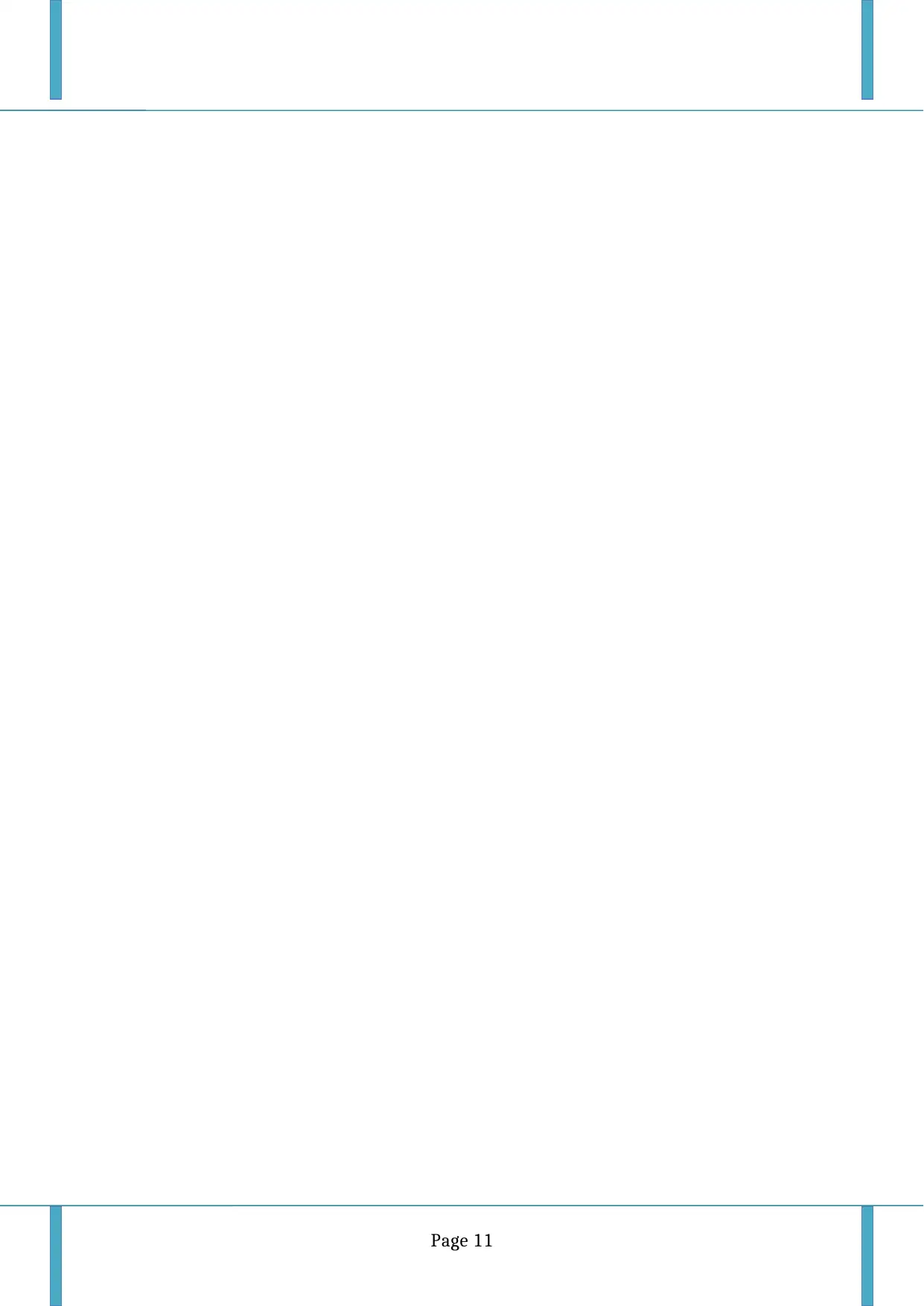
Page 11
⊘ This is a preview!⊘
Do you want full access?
Subscribe today to unlock all pages.

Trusted by 1+ million students worldwide
1 out of 15
Related Documents
Your All-in-One AI-Powered Toolkit for Academic Success.
+13062052269
info@desklib.com
Available 24*7 on WhatsApp / Email
![[object Object]](/_next/static/media/star-bottom.7253800d.svg)
Unlock your academic potential
Copyright © 2020–2025 A2Z Services. All Rights Reserved. Developed and managed by ZUCOL.





